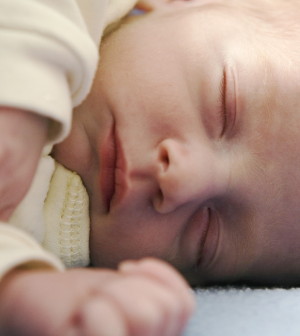- Could Your Grocery Store Meat Be Causing Recurring UTIs?
- Are You Making This Expensive Thermostat Error This Winter?
- Recognizing the Signs of Hypothyroidism
- 10 Strategies to Overcome Insomnia
- Could Artificial Sweeteners Be Aging the Brain Faster?
- Techniques for Soothing Your Nervous System
- Does the Water in Your House Smell Funny? Here’s Why
- Can a Daily Dose of Apple Cider Vinegar Actually Aid Weight Loss?
- 6 Health Beverages That Can Actually Spike Your Blood Sugar
- Treatment Options for Social Anxiety Disorder
C-Section May Raise Odds of Failed Pregnancy Later: Study


A cesarean delivery might put women at a slightly increased risk for ectopic pregnancy and stillbirth in future pregnancies, a new study finds.
However, the risk for either complication is still very low, researchers said.
The researchers analyzed data from nearly 833,000 first-time mothers in Denmark. Those whose baby was delivered by cesarean section had a 14 percent higher rate of stillbirth in their next pregnancy than those who had a vaginal delivery. A stillbirth is described as the death of a fetus at more than 20 weeks of gestation.
That works out to an absolute risk increase of 0.03 percent. That means that for every 3,000 cesarean deliveries, there would be one extra stillbirth in future pregnancies, the researchers explained.
They also found that women who had a cesarean delivery for their first baby were 9 percent more likely to have a future ectopic pregnancy than those who had a vaginal delivery.
That’s an absolute increased risk of 0.1 percent, which means that for every 1,000 cesarean deliveries, there would be one extra ectopic pregnancy in future pregnancies.
In an ectopic pregnancy, the fertilized egg grows in the fallopian tubes or other locations outside the uterus. It typically results in loss of the fetus and can be fatal for the mother.
Having a cesarean delivery for a first baby did not increase women’s risk of miscarriage in future pregnancies, according to the researchers at University College Cork in Ireland and Aarhus University in Denmark. A miscarriage is generally described as the spontaneous loss of a fetus before 20 weeks of pregnancy.
The study appears in the July 1 issue of the journal PLoS Medicine.
“The findings of the current study are particularly important for expectant mothers as well as health care professionals as cesarean section rates are increasing significantly worldwide,” study author Louise Kenny said in a journal news release.
While the study finds an association between c-sections and failed pregnancies, it does not prove a direct cause-and-effect relationship.
More information
The U.S. National Institute of Child Health and Human Development has more about cesarean delivery.
Source: HealthDay
Copyright © 2026 HealthDay. All rights reserved.










